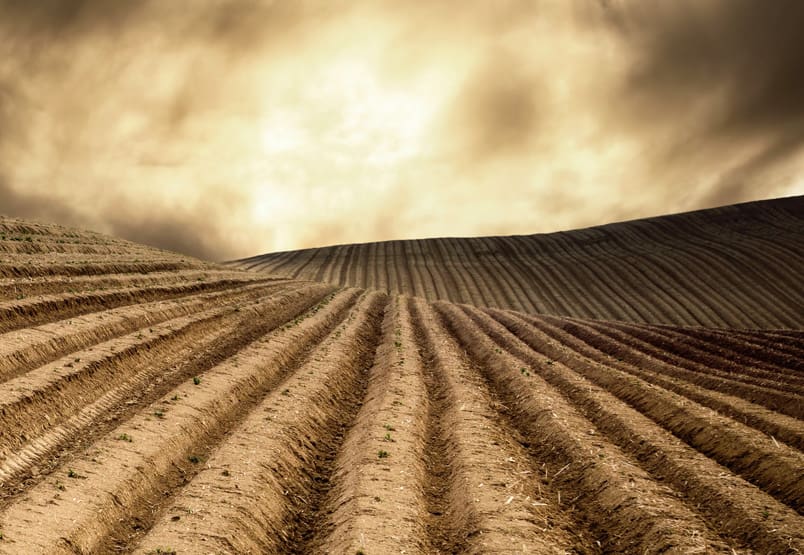
I recently woke from a dream that impacted me deeply. This particular vision was like a vintage silent movie skipping along on an old rickety film reel with scratches dashing across the screen as it played. It reminded me of the Land of Nod. The backdrop was deep brown with black undertones; however, the subject matter could not be mistaken. Someone was working in an expansive valley, breaking the hard ground getting the field ready to plant.
A man, possibly a teenage boy, dressed in raggedy clothing, with a disturbing look about him. He had a tattered straw hat on and was wearing pants cut off, frayed at the knees with suspenders, and barefoot. The laborer was in the middle of a vast field, scurrying back and forth, to and fro, as his head was shaking. I could almost hear him muttering to himself, “Gotta get this done. I go this way but wait, I must go that way. No, go back the other way. No, go forward. Go to the edge. No, go back to the front and begin again. No, still not right. Go this way,” and on, and on it went.
The camera pans out, and as the frame comes into focus, I realize the man is pushing an ancient wooden plow by himself. There are no oxen to pull the plow. I see no structures around him, and he is all alone. His head moves down, around, and side to side, but his eyes are fixated on the dry ground below the wooden blades’ pointed peaks. The dust and clumps of sod spurt up and out as the plow digs deeper and deeper into the tightly packed ground that had obviously not seen rain for many days. Oddly, no birds are singing, and the sepia tone sky is overcast, unable to reveal the sun’s location.
“No rest. No rest ’til it’s done. Must do this. Must go back here. No, go back there,” I imagine the man mumbling, then I woke up.
Cain and Abel
The first thing that came to my mind was Cain. Cain is the first son born to Adam and Eve after the serpent deceived Eve and Man fell. Cain, therefore, was the firstborn of the fallen. Was this seed to be used to removed wickedness from the line of Adam?
Cain’s name means possession, acquire, get with God’s help and is from the Hebrew root word qayin, which means spear, lance as in striking fast. The word qayin comes from the root word quwn, which means to strike, chant, wail, lament.
Cain’s brother Abel’s name means breath or vapor, from the root word hebel, which means emptiness, vanity, and unsatisfactory.
Cain, I believe, chose his own selfish desires, thinking not with a servant’s heart but from one of possession for his own glory. Yet, as we look at Abel’s name, could the spirit of vanity have played a part in the scenario? Was Cain created to expose the road that must be traveled for redemption to occur? Righteousness can never come from a heart that serves oneself, no matter the spirit in which it operates its own desires such as anger, vanity, or jealously. And by studying both Cain’s and Able’s names, we can logically deduce the spiritual dichotomy at work. One of possession, jealousy, and a quick strike in Cain versus one of thoughtlessness, to act emptily and become vain in Abel. Righteousness can only come from a heart that realizes before the world was created, the Lord established the steps for His children to take. This was a part of the redemptive body of Christ, from the beginning to the end. (John 1:1-2, 14)
When we look at Cain’s life, it says, “in the process of time” he came before the Lord. So, he and Abel, both being children of Man in a fallen state, were given an amount of time before they were brought before the Lord to present their offerings. Cain was a tiller of the land, and Abel was a keeper of sheep. Cain would have tilled the ground during this time, planted seeds, watched the roots grow, then harvested his crop. The field was made by God, but the enemy chose to sow tares as men slept, both in the physical and the spiritual. Jesus gave this parable in Matthew 13.
Another parable put he forth unto them, saying, The kingdom of heaven is likened unto a man which sowed good seed in his field: But while men slept, his enemy came and sowed tares among the wheat, and went his way.
Matthew 13:24-25 KJV (See Matthew 13:24-30)
Cain’s Mindset
Did Cain pray to God during this time or thank him as the stalks began to crown? Did he walk with joy as he navigated the rows, or did he start to dislike having to pull out the weeds around the field? Did he take time to acknowledge God and thank Him for the sun shining on his crops and the mists watering them, or did he take it for granted? Did he just plant the seeds and let God take care of everything without working the ground? Would there have been an opportunity for him to share his best produce, or did he keep it for himself and offered to God what was left over after fulfilling his own needs? Did he feel, as the firstborn, the land was his birthright and that after speaking with his brother, he decided the desire to possess the ground and his anger towards his brother was more significant than the probability of what judgment would be if he killed for it? We don’t really know the answers to these questions. Yet to pursue why Cain walked away from God, we must consider his mindset by observing his environment.
Cain brought forth what the ground had produced; however, the land had been cursed by God for Adam listening to his wife. What was the land destined to grow, seeing it was cursed, and what must Cain, being the firstborn, do to overcome this? I dare say he must overcome the curse by listening to God.
A friend loveth at all times, and a brother is born for adversity.
Proverbs 17:17 KJV
The Second Son – Abel
Abel, being the keeper of the sheep, tended them. Tend is an action verb. In other words, Abel was doing something as a shepherd. There is no curse upon the sheep, and Man had dominion over them. A shepherd looks after his flock, guides them to water and food, watches over them to protect them, and has their best interest at heart. A few other words that describe a shepherd are caretaker, guide, teacher, watcher, and protector. Abel’s offering to the Lord was not only one of the finest of his flock, but spiritually, his actions reflected what God called righteousness. We can reason that Abel believed that God was the ruler of all things and chose to do his best at the task God gave him as a shepherd and provide the firstlings, the choicest of the flock, to honor Him. He relied on God and chose to immolate himself, sacrifice his desires to perform what God required of him. Abel followed, by faith, the Kingdom government. However, did his vanity provoke Cain to respond in anger? Cain did not choose the peace of God that comes through hearkening to the Word of God and acting upon it. God had spoken truth to Cain in Genesis 4:7, telling him if he does well or not, sin lies in wait before the fateful act. (See Hebrews 11:4)
Cain, on the other hand, being the firstborn of iniquity, could only bring in the fruit from the ground, and the land was cursed by God as we see in Genesis 3:17 for Adam’s sake.
…Thou shalt not eat of it: cursed is the ground for thy sake; in sorrow shalt thou eat of it all the days of thy life
Genesis 3:17 KJV
What? Was the ground cursed so Adam would have a way of redemption? And what about Cain? Was he brought into existence to fulfill that cause? The Lord tells us in His own words that He has made even the wicked for the day of evil. (Proverbs 16:3-5) We can see that Cain was a part of God’s mysterious plan that redeemed mankind from the sin against God where man was expelled from the Garden by eating fruit from the tree of the knowledge of good and evil.
The Heart’s Desire, and the Land of Nod
In the ground of his heart, Cain decided with a wicked desire to possess that which was not his and to remove Abel as an obstacle. Once the murder occurred, God cursed Cain from the earth. (See Genesis 4:11) Execrated and removed from the chord of the first family, unable to be in integrity with the Father, Cain would forevermore be enslaved by his desire, set against God’s commands, and the earth would no longer yield any strength, power, or produce for him. A tiller was now without any ground to cultivate. He would be a dangerous fugitive that staggers and wanders aimlessly on the earth–a vagabond. The Hebrew word for vagabond is nuwd and means to shake, waver, wander, move to and fro, and nod one’s head.
Cain said to the Lord, his punishment, his guilt, was more significant than he could bear. The Lord set a mark on Cain so no one would kill him, and he departed from the presence of the Lord to live in the land of Nod. Cain was now set to dwell and remain in a land of exile, away from God. (Genesis 4:14-16) Nod is only found once in the entire King James Bible and means wandering.
Cain and Abel of the Bible
The story of Cain and Able, as presented in the Bible, is mysterious and complex. We can see how Cain reacted out of jealousy and emotions, living in nod, shaking his head. It was possible that Abel, though righteous, had a personality that may have allowed vanity or superiority to be present. However, God looks at the heart of a man. Cain made a covenant with a spirit other than God by refusing to acknowledge God’s directive that the nature of sin lay in wait. This spirit is watching for the choice of either correcting one’s behavior to line up with God’s narrow way or the will of allowing oneself to pursue his own desires and serve another god.
God provided His people with great hope to overcome and be spared the fate of Cain. That hope was manifested in the person of Jesus, the Christ, the Word made flesh, the only begotten Son. The Holy Spirit, our comforter who remained after the death, burial, and resurrection of Christ, calls us to hear His voice and not to harden our hearts as Cain did. That in our day of temptation wandering in the wilderness, we hearken to His Word. That we labor to enter into the rest that Jesus died for us to have. That we do not grieve the Holy Spirit and miss that beautiful rest that He has supplied for those who love and know His ways. There is a rest for the people of God who choose to live as believers in the Word of God, that no man, no matter how wicked can take away.
This Easter, may you be filled with the power and might of the Lord, filled with His peace to finish your journey well, and filled with joy that sustains you through even the strongest of storms. Selah.
Find out more about Glory Magazine
Feature image: Bigstock.com | Unless otherwise attributed, scripture quotations are taken from the KING JAMES VERSION of the Bible.
